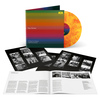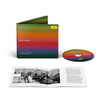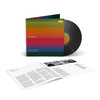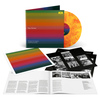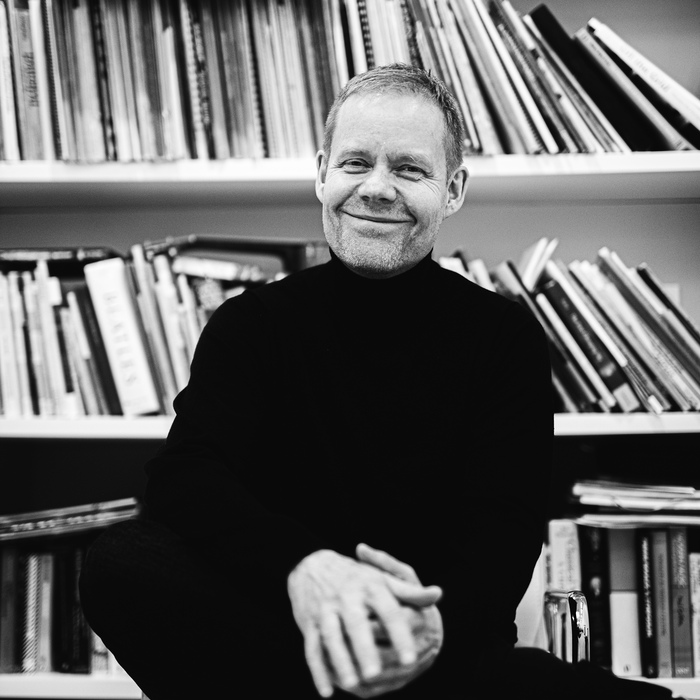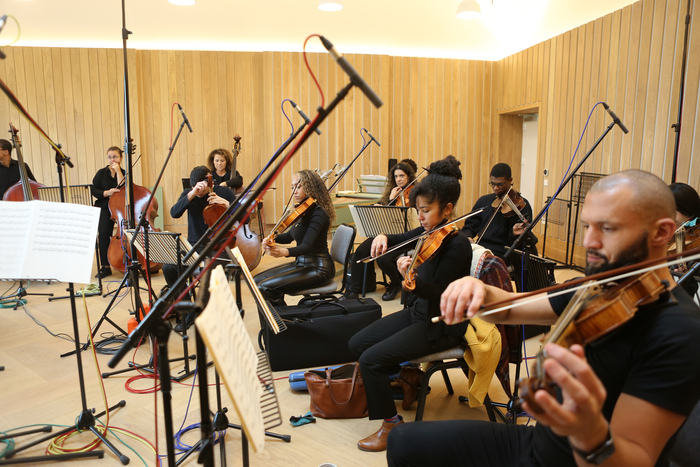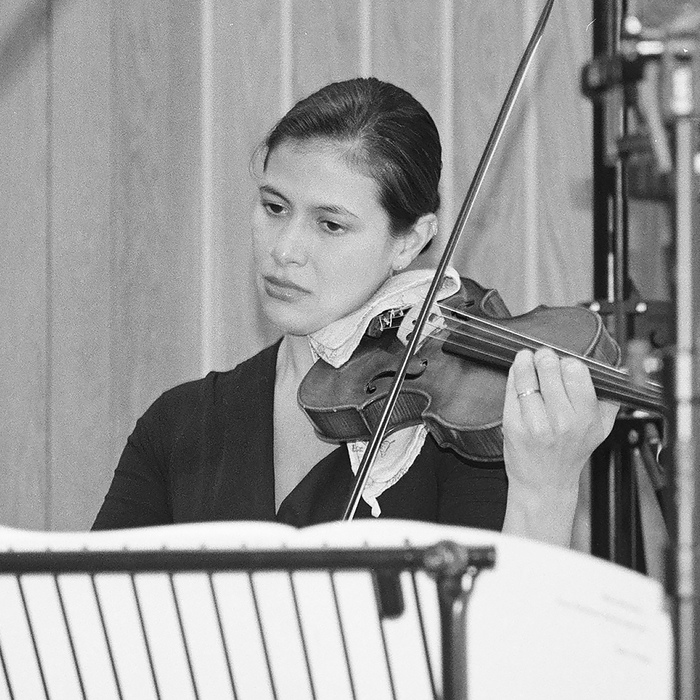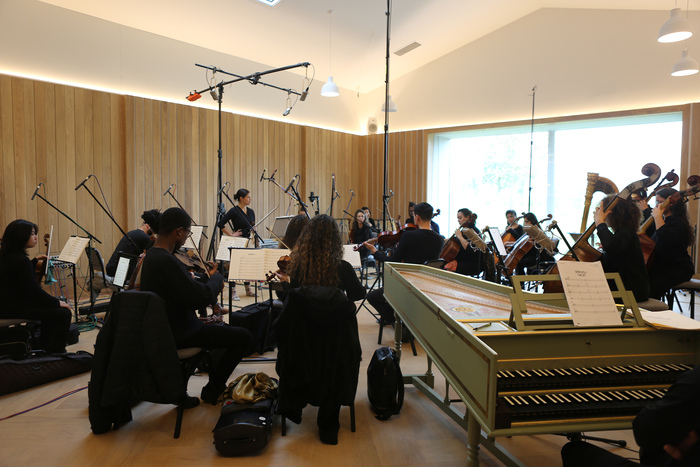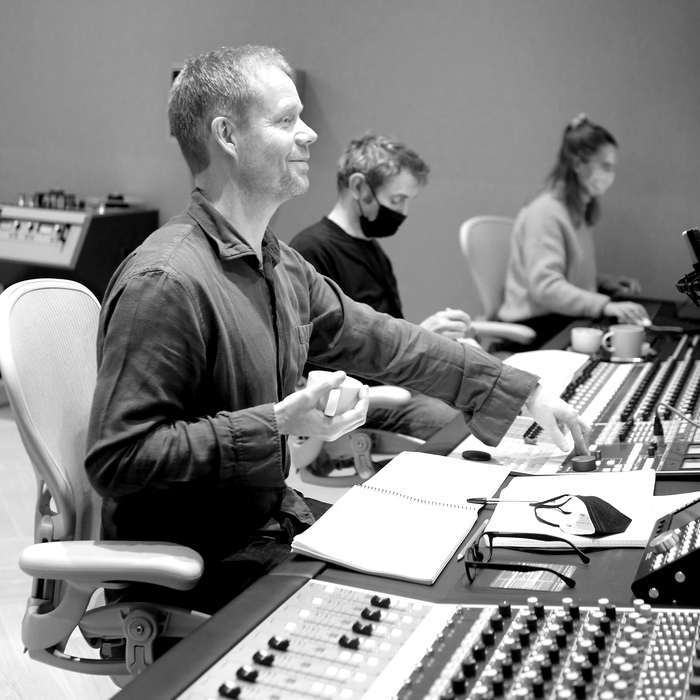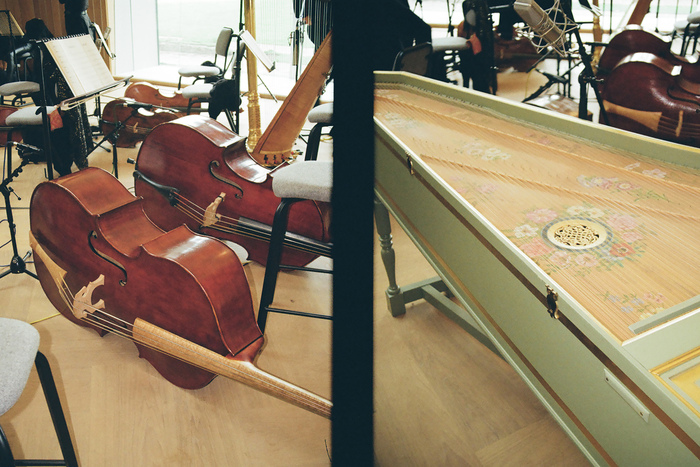Album
»Vivaldi's palette applied to the new score was extraordinary - it was like fireworks.« Max Richter
The New Four Seasons - Limited Marbled Vinyl, 180g, Gatefold + Booklet + Photos
Out: 10.6.2022
When Recomposed by Max Richter: Vivaldi – The Four Seasons Recomposed first exploded into our collective ears almost a decade ago the effect for so many people was total. We hadn’t heard anything like that, ever…
In this “alternative rendering”, Chineke! – the groundbreaking British ensemble consisting of majority Black, Asian and ethnically diverse musicians – and soloist, American violinist Elena Urioste, play on gut strings and period instruments, the kind that Vivaldi would have heard and played in his own time.
The new recording was produced on an analogue mixing desk at Richter’s own cutting edge Studio Richter Mahr, with the composer himself playing an early Moog from the 1970s.
This special, hand-numbered color vinyl edition features marbled yellow/red vinyl, a 4-page booklet, and three art prints on matte art paper with photos from the recording session.
Tracklisting:
In this “alternative rendering”, Chineke! – the groundbreaking British ensemble consisting of majority Black, Asian and ethnically diverse musicians – and soloist, American violinist Elena Urioste, play on gut strings and period instruments, the kind that Vivaldi would have heard and played in his own time.
The new recording was produced on an analogue mixing desk at Richter’s own cutting edge Studio Richter Mahr, with the composer himself playing an early Moog from the 1970s.
This special, hand-numbered color vinyl edition features marbled yellow/red vinyl, a 4-page booklet, and three art prints on matte art paper with photos from the recording session.
Tracklisting:
- Spring 0 (0:42)
- Spring 1 (2:32)
- Spring 2 (3:20)
- Spring 3 (3:03)
- Summer 1 (3:52)
- Summer 2 (3:42)
- Summer 3 (3:18)
- Autumn 1 (5:25)
- Autumn 2 (2:58)
- Autumn 3 (1:32)
- Winter 1 (2:56)
- Winter 2 (2:36)
- Winter 3 (4:06)
The New Four Seasons - Digipack + Booklet
Out: 10.6.2022
When Recomposed by Max Richter: Vivaldi – The Four Seasons Recomposed first exploded into our collective ears almost a decade ago the effect for so many people was total. We hadn’t heard anything like that, ever…
In this “alternative rendering”, Chineke! – the groundbreaking British ensemble consisting of majority Black, Asian and ethnically diverse musicians – and soloist, American violinist Elena Urioste, play on gut strings and period instruments, the kind that Vivaldi would have heard and played in his own time.
The new recording was produced on an analogue mixing desk at Richter’s own cutting edge Studio Richter Mahr, with the composer himself playing an early Moog from the 1970s.
This CD edition is presented in a 6-panel digipack with a 20-page full-color booklet.
Tracklisting:
In this “alternative rendering”, Chineke! – the groundbreaking British ensemble consisting of majority Black, Asian and ethnically diverse musicians – and soloist, American violinist Elena Urioste, play on gut strings and period instruments, the kind that Vivaldi would have heard and played in his own time.
The new recording was produced on an analogue mixing desk at Richter’s own cutting edge Studio Richter Mahr, with the composer himself playing an early Moog from the 1970s.
This CD edition is presented in a 6-panel digipack with a 20-page full-color booklet.
Tracklisting:
- Spring 0 (0:42)
- Spring 1 (2:32)
- Spring 2 (3:20)
- Spring 3 (3:03)
- Summer 1 (3:52)
- Summer 2 (3:42)
- Summer 3 (3:18)
- Autumn 1 (5:25)
- Autumn 2 (2:58)
- Autumn 3 (1:32)
- Winter 1 (2:56)
- Winter 2 (2:36)
- Winter 3 (4:06)
The New Four Seasons - Black Vinyl, 180g, Gatefold + Booklet
Out: 10.6.2022
When Recomposed by Max Richter: Vivaldi – The Four Seasons Recomposed first exploded into our collective ears almost a decade ago the effect for so many people was total. We hadn’t heard anything like that, ever…
In this “alternative rendering”, Chineke! – the groundbreaking British ensemble consisting of majority Black, Asian and ethnically diverse musicians – and soloist, American violinist Elena Urioste, play on gut strings and period instruments, the kind that Vivaldi would have heard and played in his own time.
The new recording was produced on an analogue mixing desk at Richter’s own cutting edge Studio Richter Mahr, with the composer himself playing an early Moog from the 1970s.
Tracklisting:
In this “alternative rendering”, Chineke! – the groundbreaking British ensemble consisting of majority Black, Asian and ethnically diverse musicians – and soloist, American violinist Elena Urioste, play on gut strings and period instruments, the kind that Vivaldi would have heard and played in his own time.
The new recording was produced on an analogue mixing desk at Richter’s own cutting edge Studio Richter Mahr, with the composer himself playing an early Moog from the 1970s.
Tracklisting:
- Spring 0 (0:42)
- Spring 1 (2:32)
- Spring 2 (3:20)
- Spring 3 (3:03)
- Summer 1 (3:52)
- Summer 2 (3:42)
- Summer 3 (3:18)
- Autumn 1 (5:25)
- Autumn 2 (2:58)
- Autumn 3 (1:32)
- Winter 1 (2:56)
- Winter 2 (2:36)
- Winter 3 (4:06)
The New Four Seasons - Limited Marbled Vinyl, 180g, Gatefold + signed Artprints + Booklet + Photos
Out: 10.6.2022
When Recomposed by Max Richter: Vivaldi – The Four Seasons Recomposed first exploded into our collective ears almost a decade ago the effect for so many people was total. We hadn’t heard anything like that, ever…
In this “alternative rendering”, Chineke! – the groundbreaking British ensemble consisting of majority Black, Asian and ethnically diverse musicians – and soloist, American violinist Elena Urioste, play on gut strings and period instruments, the kind that Vivaldi would have heard and played in his own time.
The new recording was produced on an analogue mixing desk at Richter’s own cutting edge Studio Richter Mahr, with the composer himself playing an early Moog from the 1970s.
This special, hand-numbered color vinyl edition features marbled yellow/red vinyl, a 4-page booklet, and three art prints on matte art paper with photos from the recording session.
This exclusive variant also contains an additional signed art print.
When Recomposed by Max Richter: Vivaldi – The Four Seasons Recomposed first exploded into our collective ears almost a decade ago the effect for so many people was total. We hadn’t heard anything like that, ever…
In this “alternative rendering”, Chineke! – the groundbreaking British ensemble consisting of majority Black, Asian and ethnically diverse musicians – and soloist, American violinist Elena Urioste, play on gut strings and period instruments, the kind that Vivaldi would have heard and played in his own time.
The new recording was produced on an analogue mixing desk at Richter’s own cutting edge Studio Richter Mahr, with the composer himself playing an early Moog from the 1970s.
This special, hand-numbered color vinyl edition features marbled yellow/red vinyl, a 4-page booklet, and three art prints on matte art paper with photos from the recording session.
This exclusive variant also contains an additional signed art print.
Tracklisting:
Spring 0 (0:42)
Spring 1 (2:32)
Spring 2 (3:20)
Spring 3 (3:03)
Summer 1 (3:52)
Summer 2 (3:42)
Summer 3 (3:18)
Autumn 1 (5:25)
Autumn 2 (2:58)
Autumn 3 (1:32)
Winter 1 (2:56)
Winter 2 (2:36)
Winter 3 (4:06)
Spring 0 (0:42)
Spring 1 (2:32)
Spring 2 (3:20)
Spring 3 (3:03)
Summer 1 (3:52)
Summer 2 (3:42)
Summer 3 (3:18)
Autumn 1 (5:25)
Autumn 2 (2:58)
Autumn 3 (1:32)
Winter 1 (2:56)
Winter 2 (2:36)
Winter 3 (4:06)
In this “alternative rendering”, Chineke! – the groundbreaking British ensemble consisting of majority Black, Asian and ethnically diverse musicians – and soloist, American violinist Elena Urioste, play on gut strings and period instruments, the kind that Vivaldi would have heard and played in his own time.
The new recording was produced on an analogue mixing desk at Richter’s own cutting edge Studio Richter Mahr, with the composer himself playing an early Moog from the 1970s.
This special, hand-numbered color vinyl edition features marbled yellow/red vinyl, a 4-page booklet, and three art prints on matte art paper with photos from the recording session.
This exclusive variant also contains an additional signed art print.
When Recomposed by Max Richter: Vivaldi – The Four Seasons Recomposed first exploded into our collective ears almost a decade ago the effect for so many people was total. We hadn’t heard anything like that, ever…
In this “alternative rendering”, Chineke! – the groundbreaking British ensemble consisting of majority Black, Asian and ethnically diverse musicians – and soloist, American violinist Elena Urioste, play on gut strings and period instruments, the kind that Vivaldi would have heard and played in his own time.
The new recording was produced on an analogue mixing desk at Richter’s own cutting edge Studio Richter Mahr, with the composer himself playing an early Moog from the 1970s.
This special, hand-numbered color vinyl edition features marbled yellow/red vinyl, a 4-page booklet, and three art prints on matte art paper with photos from the recording session.
This exclusive variant also contains an additional signed art print.
Tracklisting:
Spring 0 (0:42)
Spring 1 (2:32)
Spring 2 (3:20)
Spring 3 (3:03)
Summer 1 (3:52)
Summer 2 (3:42)
Summer 3 (3:18)
Autumn 1 (5:25)
Autumn 2 (2:58)
Autumn 3 (1:32)
Winter 1 (2:56)
Winter 2 (2:36)
Winter 3 (4:06)
Spring 0 (0:42)
Spring 1 (2:32)
Spring 2 (3:20)
Spring 3 (3:03)
Summer 1 (3:52)
Summer 2 (3:42)
Summer 3 (3:18)
Autumn 1 (5:25)
Autumn 2 (2:58)
Autumn 3 (1:32)
Winter 1 (2:56)
Winter 2 (2:36)
Winter 3 (4:06)
About
Max Richter - The New Four Seasons Vivaldi Recomposed
When Max Richter's Recomposed first exploded into our collective ears almost a decade ago, a 59-minutes-28-seconds sonic starburst, the effect on me, as for so many people, was total. I hadn't heard anything like that, ever. Experiencing it, I felt as though I was being catapulted onto another plane, reverberated through the cosmos by this epiphanic soundworld. And yet, as a long-term Vivaldi player and erstwhile Vivaldi fanatic, I also felt as though I was encountering a dear, old friend.
How, I wondered in awe, did Richter create this parallel, paradoxical, old-new and entirely beautiful thing? Over the years, I would try to fgure this out, in – say – late-night conversations, not necessarily with classical-music junkies, but with people who would listen religiously to
Recomposed with a convert's zeal. Or with musicological colleagues, who might be tempted to formally analyse Richter's treatment, yet who would have to just… stop, because what was the point, really, in trying to reduce to mere words something so ineffable? Or my kids, who ask for "Spring 3" as often as they ask for snacks, which is very often.
Music has profound, mysterious qualities that we will never comprehend, just as it has atomic, elemental qualities that some physicists maybe – just about – understand, but most of us will never fully grasp. But Richter is an unique musical mind. He is a seer. And a visionary. A performer and a listener. He is a scientist, of sorts, and a historian. He is an incredibly generous empath. He is a technician par excellence. He is up for a deep conversation, seeing life and hearing music from other perspectives. He senses points of contact between disparate genres, ages, cultures and societies, and offers up acoustical refections that we are somehow invited to participate in. Remarkably, for someone who is at the top of their feld, as Richter surely is, he is also without pretension or arrogance. Max is open; he is curious. And he is able to put all these ingredients together, holistically, like the world's f nest sonic mixologist.
No doubt, then, the original Recomposed, featuring the violinist Daniel Hope and Konzerthaus Kammerorchester Berlin, will continue weaving its magic for many years hence. But another of Richter's qualities is his appetite for experiment. He tells me about this decision to record a new version of the piece, with young collaborators, older instruments, and endlessly thought-provoking angles. "I see this as a multi-dimensional project," he explains from his recently built woodland studio in Oxfordshire, the realisation of a 20-year dream with his partner, the visual artist Yulia Mahr. "It's a new trip through this text using Vivaldi's own colours, so you have different eras talking to one another, which makes us feel how vibrant and relevant those colours still are. But, hopefully, it's also recomposing the social structure of our classical music culture to some extent, and focusing on different perspectives, which is really exciting and important to me. I don't see this as a replacement, but it is another way of looking at the material. It's like shining a light through something from a fresh angle. There's a romance about that, as if a layer of dust has been blown off."
In this "alternative rendering", Chineke! Orchestra, the groundbreaking British ensemble consisting of majority Black, Asian and ethnically diverse musicians, and the brilliant soloist, Elena Urioste, are playing on gut strings and period
instruments: the sort that Vivaldi would have heard, and played, in his own time.
"Max has strong ideas about what he wants in terms of a vibe, or a tempo, or a lightness, which this beautiful equipment, the shorter bows and the gut strings, facilitate," says Urioste. "But he is also incredibly inquisitive and collaborative. He allowed us total freedom of expression, to go off exploring together. As players we were in this very rare position: to be able to strike a balance between honouring this period sound, but not losing ourselves, our 2022-selves, in the process."
Richter is enthusiastic about this blend. "I love the slight grittiness and earthy feeling that gut strings have," he says. "I wanted to match that finty, haptic, tactile texture with the electronic elements." The new record is produced on an analogue mixing desk, with the composer himself playing an early Moog, dating from the '70s. "Those are the frst-generation synths, and I've heard them described as the Stradivarius of the synthesiser," he laughs. "They have a certain presence and authority about them. I mean, they are crude in a way, but they are also like someone inventing the wheel. They have gravitas."
Admittedly, some of us might struggle to identify vintage electronics, even if they do sound different, and intriguingly so, to our modern ears. I ask him to expand. "Nowadays, you can do all of this inside a machine," he admits. "But to me, the screen and the computer can have a sort of a fattening effect on anything that goes on inside them. These old synthesisers, by contrast, are a bit wild and unpredictable. They have personalities. They feel alive."
However you approach it, and with whichever instrumentation, musical composition is a highly complex discipline. Which is why Richter's work feels particularly masterful: I can think of no contemporary composer who is better able to translate profound human emotions into music and make it sound effortless. I know he will demur, so I avoid this observation, instead asking him how he perceives the gap between blind inspiration and hard graft. "Well, composition takes a lot of planning, strategy, architecture; f guring out the counterpoint, or the harmony, or how the form works in time. So it's a very cognitive activity," he concedes. "But I think you then internalise those calculations. All of that stuff is going on under the hood, ideally without even thinking about it. And what I'm really interested in, is what's out there beyond that pool of light? I think, creatively, you have to sort of trust the things you don't know yet. You want to get to a point with the material where it feels like it starts to have properties of its own, and a kind of intentionality, a sort of resonance. Maybe, even, a feeling of inevitability."
Richter and his young collaborators are definitely newly minting something: looking back, and askance, and sideways, and forwards. "We've all got the hinterland of the original Vivaldi Four Seasons in our minds," he says, "and along that voyage, you're always rediscovering diamonds which were hiding in plain sight. Which is a joy. But I do think there is something very exciting about treating it like a respectful dialogue with the original. As we recorded, there was a continual conversation going on with Chineke! Orchestra, with Elena, with me, about: how authentic should we be? Should it be Vivaldi through our modern lens? How should we approach that, if so? How does it marry with the new material? It has been a very rich process. We're throwing many questions out there and hoping to be surprised and delighted. And, as I hope listeners will feel, it's another way to ruminate on what the original is and what it means."
Whatever your music tastes or proclivities are, there is no question that music is a powerful means to transcend barriers across space and time, geography and culture, politics and society. "And my hope is the hope of what's to come. Of course as a composer or artist, we all have our intentions, and we will put our creations out there, in as distilled and honest way as we possibly can. But after that, you know, it's beyond our control. When a listener encounters a piece of music, they're really bringing their whole biography, and all of themselves, into that experience. That meeting point is absolutely unique to them. There can be many doorways into a piece, but it's not for me to close some of those and open others. I'm actually excited to see how people encounter a piece and what it means to them. I think that's an opportunity for me to learn things." He adds: "And one of the wonderful things about working in music, and working with great players like Elena and Chineke! Orchestra, is even if you think you know everything that's going to happen, inevitably you're absolutely f oored by something. I love that."
He reminds me about something John Cage observed, beautifully, about creative endeavour. "He said, ‘As artists, our business is curiosity.'" Richter smiles. "I just think that absolutely nails it. Creative work is about discovering things you didn't know were there."
Clemency Burton-Hill
How, I wondered in awe, did Richter create this parallel, paradoxical, old-new and entirely beautiful thing? Over the years, I would try to fgure this out, in – say – late-night conversations, not necessarily with classical-music junkies, but with people who would listen religiously to
Recomposed with a convert's zeal. Or with musicological colleagues, who might be tempted to formally analyse Richter's treatment, yet who would have to just… stop, because what was the point, really, in trying to reduce to mere words something so ineffable? Or my kids, who ask for "Spring 3" as often as they ask for snacks, which is very often.
Music has profound, mysterious qualities that we will never comprehend, just as it has atomic, elemental qualities that some physicists maybe – just about – understand, but most of us will never fully grasp. But Richter is an unique musical mind. He is a seer. And a visionary. A performer and a listener. He is a scientist, of sorts, and a historian. He is an incredibly generous empath. He is a technician par excellence. He is up for a deep conversation, seeing life and hearing music from other perspectives. He senses points of contact between disparate genres, ages, cultures and societies, and offers up acoustical refections that we are somehow invited to participate in. Remarkably, for someone who is at the top of their feld, as Richter surely is, he is also without pretension or arrogance. Max is open; he is curious. And he is able to put all these ingredients together, holistically, like the world's f nest sonic mixologist.
No doubt, then, the original Recomposed, featuring the violinist Daniel Hope and Konzerthaus Kammerorchester Berlin, will continue weaving its magic for many years hence. But another of Richter's qualities is his appetite for experiment. He tells me about this decision to record a new version of the piece, with young collaborators, older instruments, and endlessly thought-provoking angles. "I see this as a multi-dimensional project," he explains from his recently built woodland studio in Oxfordshire, the realisation of a 20-year dream with his partner, the visual artist Yulia Mahr. "It's a new trip through this text using Vivaldi's own colours, so you have different eras talking to one another, which makes us feel how vibrant and relevant those colours still are. But, hopefully, it's also recomposing the social structure of our classical music culture to some extent, and focusing on different perspectives, which is really exciting and important to me. I don't see this as a replacement, but it is another way of looking at the material. It's like shining a light through something from a fresh angle. There's a romance about that, as if a layer of dust has been blown off."
In this "alternative rendering", Chineke! Orchestra, the groundbreaking British ensemble consisting of majority Black, Asian and ethnically diverse musicians, and the brilliant soloist, Elena Urioste, are playing on gut strings and period
instruments: the sort that Vivaldi would have heard, and played, in his own time.
"Max has strong ideas about what he wants in terms of a vibe, or a tempo, or a lightness, which this beautiful equipment, the shorter bows and the gut strings, facilitate," says Urioste. "But he is also incredibly inquisitive and collaborative. He allowed us total freedom of expression, to go off exploring together. As players we were in this very rare position: to be able to strike a balance between honouring this period sound, but not losing ourselves, our 2022-selves, in the process."
Richter is enthusiastic about this blend. "I love the slight grittiness and earthy feeling that gut strings have," he says. "I wanted to match that finty, haptic, tactile texture with the electronic elements." The new record is produced on an analogue mixing desk, with the composer himself playing an early Moog, dating from the '70s. "Those are the frst-generation synths, and I've heard them described as the Stradivarius of the synthesiser," he laughs. "They have a certain presence and authority about them. I mean, they are crude in a way, but they are also like someone inventing the wheel. They have gravitas."
Admittedly, some of us might struggle to identify vintage electronics, even if they do sound different, and intriguingly so, to our modern ears. I ask him to expand. "Nowadays, you can do all of this inside a machine," he admits. "But to me, the screen and the computer can have a sort of a fattening effect on anything that goes on inside them. These old synthesisers, by contrast, are a bit wild and unpredictable. They have personalities. They feel alive."
However you approach it, and with whichever instrumentation, musical composition is a highly complex discipline. Which is why Richter's work feels particularly masterful: I can think of no contemporary composer who is better able to translate profound human emotions into music and make it sound effortless. I know he will demur, so I avoid this observation, instead asking him how he perceives the gap between blind inspiration and hard graft. "Well, composition takes a lot of planning, strategy, architecture; f guring out the counterpoint, or the harmony, or how the form works in time. So it's a very cognitive activity," he concedes. "But I think you then internalise those calculations. All of that stuff is going on under the hood, ideally without even thinking about it. And what I'm really interested in, is what's out there beyond that pool of light? I think, creatively, you have to sort of trust the things you don't know yet. You want to get to a point with the material where it feels like it starts to have properties of its own, and a kind of intentionality, a sort of resonance. Maybe, even, a feeling of inevitability."
Richter and his young collaborators are definitely newly minting something: looking back, and askance, and sideways, and forwards. "We've all got the hinterland of the original Vivaldi Four Seasons in our minds," he says, "and along that voyage, you're always rediscovering diamonds which were hiding in plain sight. Which is a joy. But I do think there is something very exciting about treating it like a respectful dialogue with the original. As we recorded, there was a continual conversation going on with Chineke! Orchestra, with Elena, with me, about: how authentic should we be? Should it be Vivaldi through our modern lens? How should we approach that, if so? How does it marry with the new material? It has been a very rich process. We're throwing many questions out there and hoping to be surprised and delighted. And, as I hope listeners will feel, it's another way to ruminate on what the original is and what it means."
Whatever your music tastes or proclivities are, there is no question that music is a powerful means to transcend barriers across space and time, geography and culture, politics and society. "And my hope is the hope of what's to come. Of course as a composer or artist, we all have our intentions, and we will put our creations out there, in as distilled and honest way as we possibly can. But after that, you know, it's beyond our control. When a listener encounters a piece of music, they're really bringing their whole biography, and all of themselves, into that experience. That meeting point is absolutely unique to them. There can be many doorways into a piece, but it's not for me to close some of those and open others. I'm actually excited to see how people encounter a piece and what it means to them. I think that's an opportunity for me to learn things." He adds: "And one of the wonderful things about working in music, and working with great players like Elena and Chineke! Orchestra, is even if you think you know everything that's going to happen, inevitably you're absolutely f oored by something. I love that."
He reminds me about something John Cage observed, beautifully, about creative endeavour. "He said, ‘As artists, our business is curiosity.'" Richter smiles. "I just think that absolutely nails it. Creative work is about discovering things you didn't know were there."
Clemency Burton-Hill
